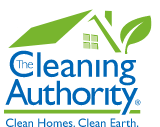At The Cleaning Authority, we love our pets, and our homes reflect that! From the customized food bowl in the kitchen to the toy bin in every room, it’s evident that our pets carry a large presence in the home. And with their presence comes a lot of items – pet beds, brushes, collars and leashes, toys, treats, and more!
Read more to learn how to properly clean your pet’s most frequently used items.
Collars / Leashes
Think of your pet’s collars and leashes as comparable to a staple item you wear every day – after a while it can get gross or smelly, right? Collars, leashes, and harnesses should be washed at least once a month to prevent bacteria growth. Common fabrics such as nylon can be washed in the washing machine in a garment bag on a delicate cycle, or hand washed with mild soap and hot water. If your pet wears a leather collar, fill a bowl with hot water and a few drops of your pet’s shampoo, and let the collar soak for 10-15 minutes. If the collar has any stains or tough marks, scrub with a toothbrush. Rinse the collar and hang it to air dry.
Beds and Blankets
Washing your pet’s bedding depends on many factors, including shedding, odors, human and pet allergens, as well as outdoor activity. Generally, we recommend washing your pet’s beds and blankets once a week. Pets pick up dirt, dust, allergens, and food residue in their daily routine, and they can track it throughout the home. Most pet beds and blankets are washing machine-friendly, but you should always check manufacturer tags to confirm recommended temperature and drying instructions. To protect pets with sensitive skin, use unscented detergent. If you have a heavy shedder, vacuum your pet’s belongings before putting it in the washing machine to avoid a load of laundry full of Fido’s hair later in the day.
Food/Water Bowls – According to a study by the National Safety Federation, pet dishes were listed as the fourth germiest item in your home. Your pet’s bowls can either be washed via hand or in the dishwasher. If you choose to handwash, use soap and hot water, rinse thoroughly, and allow to air dry. If you opt for the dishwasher, place it in the dishwasher, and treat just like your human bowls. It is extremely important to wash your bowls daily to remove any remaining food, as it can retain bacteria and germs harmful to your pet.
- Bonus Tip – Don’t forget the food scoop!
Toys – Following food and water bowls, pet toys were listed as the seventh germiest item in the home by the NSF. Toys should be washed at least monthly or more if your pet is playing with them outdoors. Toys can harbor bacteria, yeast, and mold in the home.
- Soft: Soft toys can be washed in a garment bag in the washing machine on sanitizing cycle. Use a natural, unscented detergent or create a DIY mixture of baking soda and vinegar on the rinse cycle. We recommend air drying or drying on a low heat setting. If your toy is starting to fray, or the squeaker or stuffing is starting to come out, discard it for the safety of your pet.
- Hard: Popular hard toys such as frisbees, balls, puzzle toys, and rubber toys can be hand washed with a scrub brush and hot soapy water or placed in the dishwasher on the top rack only. If placed in the dishwasher, add 2 tablespoons of vinegar at the bottom.
Once you are done cleaning Fido and Max’s favorite items, opt for a fun activity you both enjoy – like going to the park! We are always here for the rest of your cleaning needs – to set up an estimate, visit: https://estimate.thecleaningauthority.com or call 866.827.0062 for more information!

